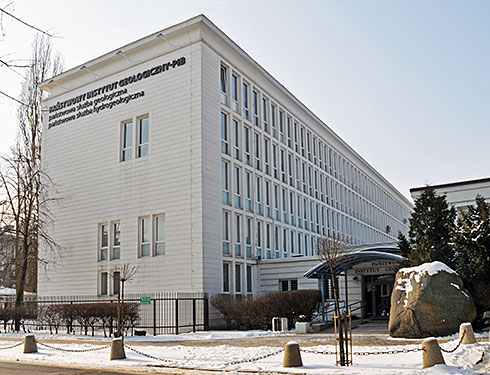
The Polish Geological Institute - National Research Institute (PGI-NRI) is one of Poland's oldest nationwide scientific institutes. It was established on 30th of May 1919 by a resolution of the Legislative Sejm of the Republic of Poland.
Thanks to the Institute's research, Poland's most important mineral deposits - copper, silver, native sulphur, hard coal, lignite, rock salt, potassium salts, iron ore, titanium, vanadium, zinc, lead - were discovered.
In accordance with the "Geological and Mining Law" Act, PGI-NRI fulfils the tasks of the state geological survey. The tasks of the survey are strictly defined in this act, as well as in the "Water Law" act. The Institute is supervised by the Minister of Climate and Environment.
In February 2009, in recognition of the Institute's services to the development of Polish science and economy, the Council of Ministers granted PGI the status of a National Research Institute.
The head office in Warsaw and seven regional units (Gdańsk, Kielce, Kraków, Lublin, Sosnowiec, Szczecin, Wrocław) employ slightly over 900 people. Most of the employees are geologists of various specializations - 135 people have doctoral degrees, and 22 people have habilitation degrees.
Our key activities cover three areas: ENERGY, RAW MATERIALS AND THE ENVIRONMENT.
The ENERGY pillar is the area of activities we carry out for the energy transformation. The projects we implement are aimed at increasing the role of energy from renewable sources in the energy mix - thermal waters and energy stored in the ground. It also provides support in identifying the geological structure in terms of structures for underground storage of energy raw materials.
Activities in the RAW MATERIALS area are aimed at supporting the implementation of the objectives of the State Raw Materials Policy. They concern primarily the assessment of the potential of mineral resources in the country, as well as the registration of mineral deposits and their protection. It also includes activities aimed at identifying and balancing groundwater.
The ENVIRONMENT pillar includes activities supporting the implementation of sustainable development goals. Comprehensive research is aimed at assessing the state of the environment, identifying and monitoring geological and anthropogenic hazards, supporting climate change adaptation, and ensuring the safety of strategic investments.
Our priority is also to comprehensively disseminate geological knowledge using various information channels.
We collect geological data from across the country on behalf of the State Treasury. These data, mostly in digital form, are made available by the Central Geological Archive and specialist databases. We are the coordinator and principal contractor for a number of digital serial and thematic geological maps.
We run specialized laboratories equipped with modern research equipment from leading global manufacturers. The Chemical Laboratory, the Soil and Rock Research Center and the Environmental Sampling Team are accredited by the Polish Center for Accreditation.
PGI-NRI cooperates with around 200 national entities each year. Cooperation with the state administration plays a key role. In addition, cooperation is carried out with universities, scientific institutes, companies active in geology and those providing non-geological services.
We collaborate with geological centres from dozens of countries around the world. We are a member of EuroGeoSurveys, an organisation of European geological surveys. We participate in the preparation of studies carried out under its umbrella and take an active part in the work of expert groups whose purpose is to advise the relevant European Commission structures. We work with both geological surveys, scientific research institutions, universities and international research organisations.














 PGI-NRI offer
PGI-NRI offer Mineral resources of Poland
Mineral resources of Poland  Oil and Gas in Poland
Oil and Gas in Poland 



 Subscribe to RSS Feed
Subscribe to RSS Feed